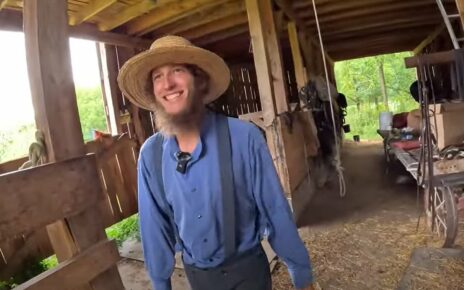Save articles for later
Add articles to your saved list and come back to them any time.
The powerful national farm lobby is siding with Opposition Leader Peter Dutton as he backs locals fighting renewable energy projects crucial to the Albanese government’s clean energy election commitments.
The National Farmers Federation created waves in 2020 when it outflanked the federal Coalition government on climate policy to set an industry-leading target to reach net zero greenhouse emissions by 2050 for the nation’s agriculture sector.
Farmers from Victoria’s western district at the steps of state parliament protesting the rollout of transmission lines through their region.Credit: Joe Armao.
But the peak agriculture lobby last week launched a ‘Keep Farmers Farming’ campaign, warning that renewables projects coupled with a vast array of transmission lines to link them to the cities are damaging primary production.
Opposition Leader Peter Dutton has been travelling the east coast to visit local campaigns against offshore wind projects, which are crucial to Climate Change and Energy Minister Chris Bowen’s plans to create new, clean blue-collar jobs in Australia’s old industrial heartland in the Latrobe Valley, Wollongong, Newcastle and Central Queensland.
Bowen launched a review of the community consultation process in July, which will report to government in December.
The slowdown of the rollout puts at risk the government’s pledge to ramp up clean energy in the electricity grid to bring power bills down by $275 by 2025.
Government-commissioned modelling shows the share of renewables in the grid needs to dramatically rise to 82 per cent by 2030. It is currently comprised of 57 per cent coal power, 5 per cent gas, 7 per cent hydro, 18 per cent solar and 13 per cent wind.
David Jochinke last week replaced Fiona Simson as National Farmers’ Federation president. In Simson’s tenure the traditionally conservative lobby group broke ranks with the rural Nationals party with its net-zero commitment, prompting former Agriculture Minister David Littleproud to accuse the federation of “blindly setting a course” on emissions reduction.
Both Jochinke and Dutton stress they support renewable energy to cut emissions and tackle global warming, but they are championing campaigns that threaten the government’s goals.
Jochinke is calling for governments to improve consultation between landholders and project proponents over issues such as power line routes, and for prime farmland to be protected from harmful development.
“We’re seeing more and more communities reach breaking point because they’re being stepped over in the energy transition,” Jochinke said.
“We just want them to regulate how energy companies are engaging with landholders and communities so they’re treated fairly. It’s clear the current system of trying to bulldoze through communities is putting everything in the slow lane.”
The federal government has created five offshore wind zones where developers can make a development application: Wollongong and Newcastle in NSW, the Southern Ocean between the Victoria and South Australian border, Bass Strait and the Gipplsand coast near the Latrobe Valley.
Dutton, who promotes uncommercial but emerging nuclear energy technology to supplement renewable energy, visited the Newcastle region twice in the past few weeks and claimed the push for an offshore wind industry could become a national scandal.
“I think the rising level of anger here is something that Australians really should take note of,” he said at a press conference in Nelson Bay last week.
“The consultation needs to be redone so that the local concerns can be properly understood. I think if the local concerns are properly understood and acted on, I’d be very surprised if this project goes ahead.”
Industry advocates say offshore wind can supply baseload-like power to revitalise manufacturing in former regional industrial hubs.
Beyond Zero Emissions found that offshore wind precincts at old industrial centres could generate 45,000 new and ongoing jobs by 2032 and generate $13 billion in annual revenue, with growth in green steel, hydrogen and cement manufacturing.
Peter Dutton was contacted for comment.
Cut through the noise of federal politics with news, views and expert analysis. Subscribers can sign up to our weekly Inside Politics newsletter.
Most Viewed in Politics
From our partners
Source: Read Full Article



